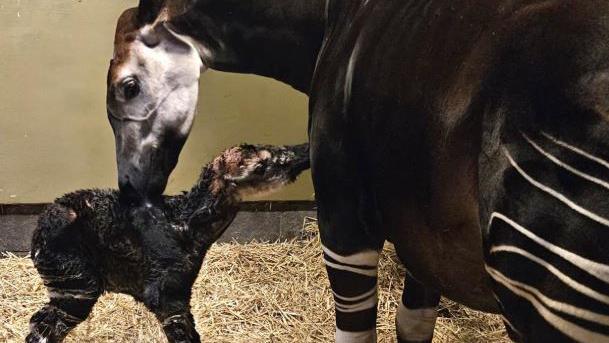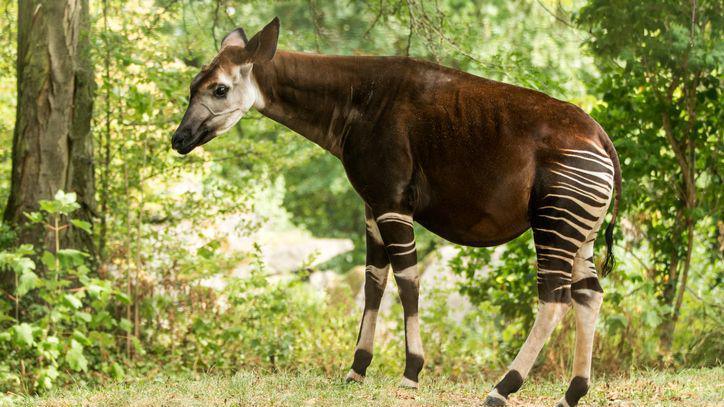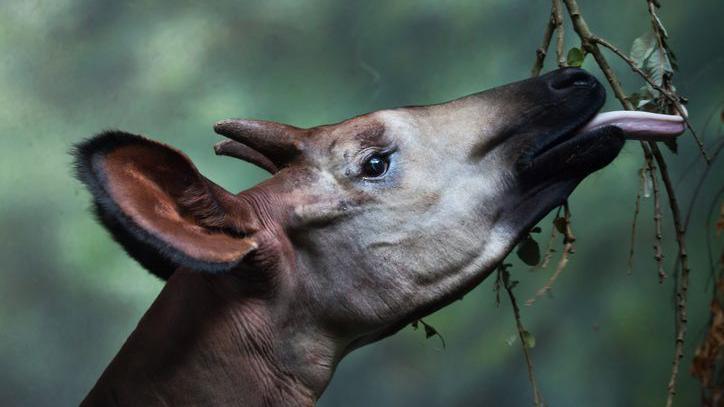Meet Kayemba - the rare okapi born at Marwell Zoo

Keepers say both mother and baby are doing very well
- Published
A rare okapi has been born at Marwell Zoo in southern England.
The baby calf has been named Kayemba after a village in the Democratic Republic of Congo – the only place in the world where okapis are found in the wild.
Keepers say that they are delighted with Kayemba's progress.
The new arrival is a huge boost for conservation efforts, with okapis listed as endangered on the International Union for the Conservation of Nature (IUCN) red list of threatened species.
More animal news
From pirate spiders to veggie piranhas - this year's newly named species
- Published20 December 2024
Humpback whale and other epic migrations
- Published11 December 2024
Nikon Comedy Wildlife Awards: Hilarious winning pictures revealed
- Published10 December 2024

Okapis live in dense tropical rainforests
Kayemba arrived on 28 October and keepers say that the calf's mother, Niari, is proving to be a great mum to her new arrival.
Zoe Newnham, from Marwell Zoo, explained that "Niari has been an attentive and brilliant mum so far" and that Kayemba "is doing very well."
She added that the baby okapi was "feeding regularly, nesting, and occasionally exploring his surroundings under Niari's watchful eye."
Okapis live in the dense rainforests of central Africa, however they face increasing threats from habitat loss, poaching and illegal mining.
According to the Zoo, there are thought to be fewer than 10,000 okapis estimated to remain in the wild.
Ms Newnham said: "The birth of the new calf is an exciting and emotional time for the team.
"While moments like this are cause for celebration, they also remind us of the urgent need to protect wild populations."
Top okapi facts

1. They belong to the giraffe family - Despite having distinctive zebra-like black and white stripes on their back legs, okapis are actually the giraffe's only living relative.
As a result, the mammals are often known as the 'forest giraffe'.
2. Wild okapis only live in one country - The animals can only be found in the Democratic Republic of Congo in central Africa.
They live in the country's dense tropical rainforests and have even featured on Congo's banknotes.
3. They are very shy animals - Okapis are rarely seen in the wild as they are solitary animals and their dark fur coat and striped legs help camouflage them in the shadows of the rainforest.
In fact, their shy nature meant the animals were only discovered for the first time last century.
4. Okapis have super long tongues - Okapis are herbivores and they use their long tongues to help them easily grab onto leaves and branches when they're feeding.
In fact, their tongues can be up to 30cm in length - long enough to clean their nose, eyes and even their ears!
5. Newborn okapis don't poo - Did you know that okapi calves do not poo for the first 40 to 60 days of life.
Experts think okapis evolved this unusual feature to help reduce the chances of young calves being spotted by predators in the wild.
